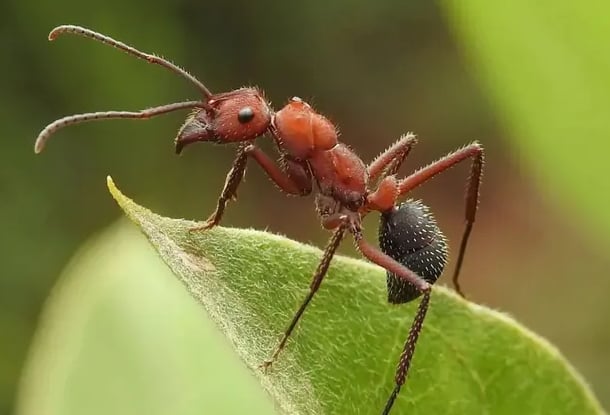November 10, 2025 | 18:19 GMT +7
November 10, 2025 | 18:19 GMT +7
Hotline: 0913.378.918
November 10, 2025 | 18:19 GMT +7
Hotline: 0913.378.918

A tropical Ectatomma ant, one of the world’s 14,000 species, many of which can do the job of chemicals by killing pests that harm crops. Photo: José Pezzonia
Ants can be more effective than pesticides at helping farmers produce food, according to new research. They are better at killing pests, reducing plant damage and increasing crop yields, according to the first systematic review of ants’ contributions to crop production.
Ants are generalist predators and hunt pests that damage fruits, seeds and leaves, leading to a drop in crop yields. A greater diversity of ants generally provides more protection against a wider range of pests, the study found.
The analysis looked at 17 crops, including citrus, mango, apple and soya bean in countries including the US, Australia, the UK and Brazil. “In general, with proper management, ants can be useful pest controls and increase crop yield over time. Some ant species have similar or higher efficacy than pesticides, at lower costs,” researchers wrote in the paper published in Proceedings of Royal Society B.
The Brazilian team looked at 26 species, most of them tree ants, which nest on plants or the ground but often climb plants. They found ants do best in diversified farming systems such as agroforestry (where trees and crops are grown on the same land) and shade-grown crops because there are more nesting sites and food resources for them.
Lead researcher Dr Diego Anjos, from the Federal University of Uberlândia, said: “Our study encourages farmers to use more sustainable practices such as biological control provided by ants and practices of shaded crops as a way to naturally promote ants in crop systems.”
The role of ants in agriculture is not yet completely clear because they can also be a problem. Pests such as mealybugs, aphids and whiteflies, which produce a sugary water called honeydew, are generally more common when ants are around. This is because the ants feed on honeydew, and so essentially “farm” aphids like livestock, protecting them from predators in return.
Researchers say nature-friendly management practices such as providing an alternative source of sugars (on the ground, near a tree’s trunk or on its branches) can interrupt this relationship. The ants are distracted and can continue to reduce the number of other pests such as caterpillars and beetles, which do not produce honeydew.
The paper looked at most insect species that are considered pests around the world, covering 30 species across 52 studies. The data came from studies comparing groups of plants with ants set against plants where the ants were removed (mechanically or chemically), which strongly indicates the ants were responsible for the changes observed.
There are more ants than any other insect, making up half of the planet’s insect biomass. There are at least 14,000 known species of ant, with many more likely to remain unknown. Citrus growers in China have used ants in farming for centuries, and the insects have also been used to help control forest pests in Canada, cocoa pests in Ghana and crop pests in Nigeria.
Ants found in the Pacific islands of Fiji can cultivate and grow at least six species of plant, as part of a mutually beneficial relationship that dates back 3 million years, according to research published in Nature.
Dr Patrick Milligan, from the University of Nevada Pringle Lab, was not involved in the study but said the findings were “both heartening and not at all surprising”. He added: “They offer a neat and tidy description of ant-derived benefits that are ubiquitous across ecological and agricultural systems.
“This is essentially another option in our farming toolset that can allow agriculture to move away from pesticides – which really damage neighbouring insect communities – but still improve crop yields.”
Prof Adam Hart from the University of Gloucestershire, also not involved in the research, said it was confirmation of the important role ants have as pest controllers. “Many of us have been talking about ants as natural pest controllers. But, as with anything, it is usually more complex than we think once we start digging deeper.
“The research suggests it may be profitable to move ant colonies into crop areas, and to do things to encourage the presence of ants. However, we need to be cautious – it isn’t all ants, or all crop systems, and they can have a cost. It’s all about developing a greater understanding of how ants interact with crop pests and other organisms.
“A big take-home message for me is that we need to understand even more about fine-scale interactions if we are to farm better. In other words, we need more ecologists.”
(The Guardian)

(VAN) FAO Director-General conveys message at General Plenary Leaders Dialogue at Climate Summit in Brazil.

(VAN) Much has been said about the threat to European broiler meat industry from the EU-Mercosur deal, while the potential impact on egg segment is largely neglected, said National Chamber of Poultry and Feed Producers.

(VAN) There’s an old climate joke that goes, 'You may not believe in climate change, but your insurance company does'.

(VAN) Probiotics have emerged as a promising tool in poultry production, offering a natural and effective means to enhance the health and productivity of poultry.

(VAN) Interview with Kaveh Zahedi, FAO’s Director for Climate Change, Biodiversity and Environment.

(VAN) China has begun purchasing U.S. farm products after leaders of both countries met last week, but traders await soybean purchases after the White House said Beijing pledged to buy 12 million tons by year-end.

(VAN) The State of Food and Agriculture 2025 report focuses on land degradation caused by human activities.